Footloose
 for some teen drug and alcohol use, sexual content, violence and language.
for some teen drug and alcohol use, sexual content, violence and language.
Reviewed by: Kenneth R. Morefield
CONTRIBUTOR
| Moral Rating: | Average |
| Moviemaking Quality: |
|
| Primary Audience: | Teens |
| Genre: | Music Romance Comedy Remake |
| Length: | 1 hr. 53 min. |
| Year of Release: | 2011 |
| USA Release: |
October 14, 2011 (wide—3,300+ theaters) DVD: March 6, 2012 |
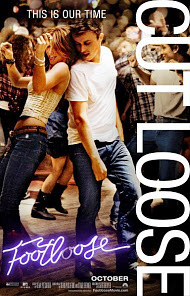

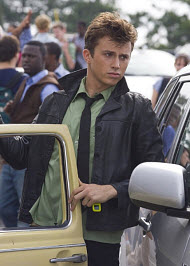
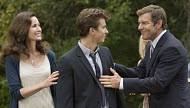
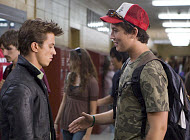
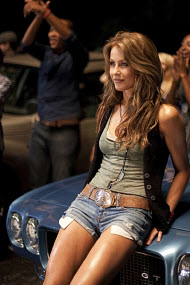
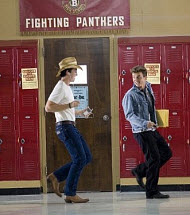
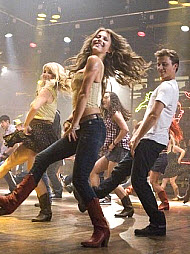
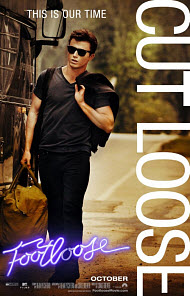
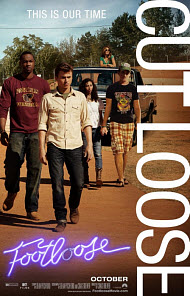
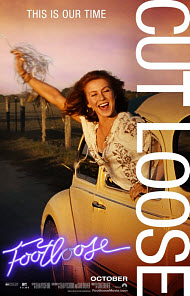

dancing in the Bible
HYPOCRISY IN THE CHURCH — “I would never be a Christian; they’re a bunch of hypocrites.”
PURITY—Should I save sex for marriage? Answer
My boyfriend wants to have sex. I don’t want to lose him. What should I do? Answer
How can I deal with temptations? Answer
How far is too far? What are the guidelines for dating relationships? Answer
NUDITY—Why are humans supposed to wear clothes? Answer
How do I know what is right from wrong? Answer
Are we living in a moral Stone Age? Answer
| Featuring |
|---|
|
Dennis Quaid … Rev. Shaw Moore Miles Teller … Willard Julianne Hough … Ariel Moore Andie MacDowell … Vi Moore Kenny Wormald … Ren MacCormack Ziah Colon … Rusty Rodriguez Ray McKinnon … Wes Warnicker See all » |
| Director |
| Craig Brewer—“Hustle and Flow,” “Black Snake Moan” |
| Producer |
|
Paramount Pictures Corporation Dylan Sellers Productions MTV Films See all » |
| Distributor |
“This is our time.”
A remake of a 1984 film of the same title, “Footloose” stars Kenny Wormald as Ren MacCormack, an urban transplant to a small, rural town where dancing has been literally outlawed. Ren is a basically good kid who runs afoul of uptight locals more out of cultural shock than actual rebelliousness. In fact, Ren has arrived fresh from being the primary caretaker for a mother who died of leukemia.
The blue laws have been spearheaded by Rev. Shaw Moore (Dennis Quaid), whose son was killed in a post-dance car crash that also took the lives of four other teens. With the reverend’s rebellious daughter, Ariel (Julianne Hough) already sneaking out to the dirt racetrack for sexual experimentation and to the local drive-in for impromptu dancing, the already precarious hold that the town elders have on teen discipline is shaken by Ren’s usually respectful but constant questioning of the status quo.
I generally subscribe to the Roger Ebert philosophy that you re-watch good movies and only remake bad (or flawed) ones. The original “Footloose” was not some sacrosanct cultural shrine that should not be messed with, but I struggled to see how the new version was (or was intended to be) an improvement. The ante is upped by giving the mass-death back story more time, and the teens are bigger, mouthier and more sexually promiscuous than I remember them being in the original. Many of the iconic songs from the 80s are giving southern-rock or country covers by contemporary musicians. A game of head-on chicken with two teens on tractors in the original becomes a demolition derby of buses racing around a figure eight track complete with Ren diving from a burning vehicle before it smashes into another bus and busts into flames. Yeah, can’t imagine why the parents in this town worry that these kids lack the common sense to survive even an afternoon with freedoms teenagers in the rest of the country take for granted.
A good deal of the pre-release buzz surrounding the film hinted that the improvement was going to be in the humanizing and softening of Revered Moore’s character. It’s true that Quaid plays Shaw as one of those preachers with a politician’s smile and little of the original character’s (played by John Lithgow) moral haughtiness. Moore’s misguided social engineering comes from a place of hurt and fear, rather than pharisaical hypocrisy, but he is still portrayed as a bit of a clueless (and hopelessly naïve) fool, trying to use the rule of law to control his daughter’s behavior, rather than, you know, being a presence in her life.
A scene where Ren reads from the Bible also misses much of the point of the same scene in the original. In that film, Ariel is able to mark passages for Ren to use, because, deep down, she has been listening, and Ren uses passages from Psalms and Ecclesiastes to argue that dancing is not inherently bad—can, in fact, be an act of worship or celebration. His argument is that not all dance is an act of rebellion, not (as the new film appears to intimate) that venting a little rebelliousness and engaging in a little sexually provocative grinding curbs the appetite and reduces the need to act out in even more destructive ways.
One element that is improved is, well, the actual dancing. Wormald is a dancer first and an actor second, so he doesn’t need a stunt double for his scenes. That’s well and good, yet the film oddly chooses to echo (sometimes shot for shot) the chop and cut editing of the original that was used to mask the fact that Bacon was not always the one playing Ren during dance scenes. If one were to take the ten minutes or so of actual dancing out of the film and put it in a music video (once upon a time kids, there was a thing called MTV, because we didn’t have YouTube), one could easily find moments of kinetic beauty and energy that are in a formal way more poignant than any emotion the narrative is able to evoke.
In terms of potentially objectionable content, “Footloose” is less explicit than most contemporary teen movies, but still raunchier than it needs to be—and definitely sexed up from the original. Ariel and her pre-Ren boyfriend have sex in the back of a truck, though the camera cuts away once the undressing begins. Ariel also takes off her top to use as a flag at the race track, spending the rest of the scene in just a bra. There are plenty of shots of tight jeans and cleavage, and boys and girls take turns ogling each other. Ariel’s boyfriend uses a homophobic slur to describe Ren, and he, in turn, calls his detractor an a—hole. Profanity pretty much stays at the level of “damn” (followed by jokes about swearing in church). Overall, while the language is not too graphic there is a very steady trickle of it. There is also a moderate amount of interpersonal violence, including two scenes where a male character hits a female, and a third in which the girlfriends in prom dresses help their beaus beat down bullies trying to interrupt the dance.
“Footloose” will probably win some fans for depicting faith issues and not totally demonizing the morally conservative point of view, but, in trying to stay hip and contemporary, it shies away from anything that could be remotely construed as defending that point of view. Rev. Shaw may not be a monster, but he’s still portrayed as in the wrong, and personal purity and morality can only really be conceived of as means towards the end of keeping the kids a bit safer from harm, not as qualities of any intrinsic value.
Violence: Mild / Profanity: Moderate / Sex/Nudity: Mild
Are we living in a moral Stone Age? Answer
See list of Relevant Issues—questions-and-answers.


Yes, there is teen rebellion, drinking, and implied sex… but the downsides of out-of-control behavior were shown, too. I thought Julianne Hough was much more likeable than the girl in the old one, and Dennis Quaid, though grumpy, did a good job of showing more than one side of his character. This is an example of a remake that honors the former version while making for a better story… plus, it was just plain fun to watch! A good friends-night-out film.
Moral rating: Average / Moviemaking quality: 4½
Moral rating: Average / Moviemaking quality: 3
Moral rating: Offensive / Moviemaking quality: 4
In comparison with the original movie made in the 80s, this movie does not reproduce the “spirit” of the original film, and instead has an evil spirit that will probably tempt most men (and women) to give over to the “lust of the eyes” (1 John 2:16). I recommend that you see the original movie made in the 80s before even considering this one.
If “Footloose” (2011) in any way reflects how our culture has changed since the first movie was made, I’d hate to think what this movie will be like if they remake it again 20 years from now. Ten years ago I was shocked to hear about 12 year old girls getting pregnant, but in this present day, we have 9 year olds getting pregnant…
Sex is being sold everywhere, and preaching the Gospel is still the only way to reach this world. You can’t expect redeemed behavior from unredeemed people.
Moral rating: Offensive / Moviemaking quality: 4
One viewpoint I can add as a Pentecostal who believes in using dance as a form of worship to the One true God Jesus Christ, is before I was born again according to John 3:5 and Acts 2:38, I replaced my longing for God’s presence with some of the similar sins in this movie. I also attended a church that was dry and dead as in “Footloose,” also there was no in filling of the Spirit and celebration of a life redeemed and set free, similar to the church portrayed here. We do not serve a dead God, but Jesus is alive and well. He is worthy of all praise we could ever possibly give. He inhabits (lives in) the praises of His people. My Pastor always says if they can do all that and more for their God, why wouldn’t we want to give God our absolute best in worship. It will set us free from the desires of the flesh that are against the way God would have us to live, and I am thankful He has shown me this truth. Amen
Moral rating: Very Offensive / Moviemaking quality: 3
Of course, the human heart needs no help in reaching out to bring these characteristics into play, we desperately need Christ in order to get out of that mess. But we have reached a new level of it in our desire to be entertained. Attitude and lack of self-control is abundant in the preview for this film and is as bad as the violence in many films. The idea that if you are talented or passionate, it justifies bad attitude and rebellion is nothing more than finding an excuse for satanic influence to rule oneself.
If the Mafia contributed millions of dollars for children’s clubs in communities, it would not classify the Mafia as benevolent. In other words, there is no excuse for rebellion and lack of respect for others. I Sam 15:23 — “For rebellion is like the sin of divination, and arrogance like the evil of idolatry.”
This movie cannot be of any use in a positive sense except to portray an example of what to stay away from.


Calling this movie “Satanic,” like one person mentioned, makes me wonder if they attend the Westboro Baptist Church (the “Christians” who protest funerals”). Satanic?? Really??? Come on… The girl struggles because her dad is a pastor, and, like most rebellious teenagers, she’s going through a lot because of the loss with her brother. She’s doing all she can to remain sane having a pastor father who won’t let her live life for fear she’ll end up like her brother.
I understand both sides. But in the end, all things worked out. This was a great movie and even an uplifting movie. It’s not a TBN flick, so if people are looking for that, please look elsewhere.
My Ratings: Moral rating: Average / Moviemaking quality: 4